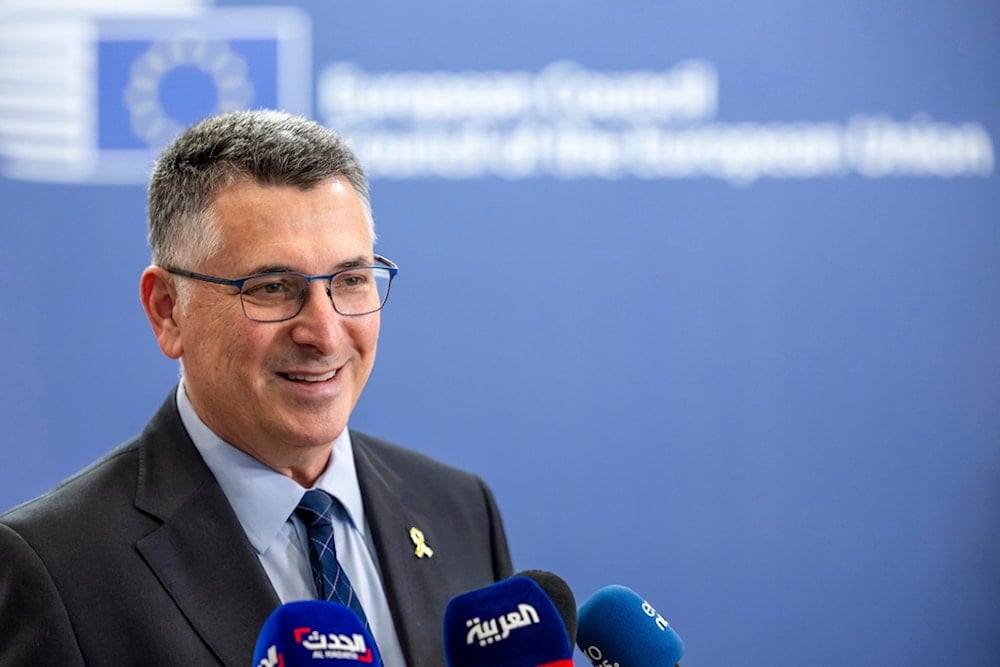Israeli FM threatens unilateral action over Palestinian statehood
Israeli FM Gideon Saar called recognition of Palestinian statehood a “mistake,” warning of unilateral action as settlement expansion and annexation plans advance.
-

Israeli Foreign Minister Gideon Sa'ar talks with journalists as he arrives for the EU-Southern Neighbourhood ministerial meeting at the EU Council building in Brussels, Monday, July 14, 2025 (AP)
Israeli Foreign Minister Gideon Saar branded international efforts to recognise Palestinian statehood a “mistake” on Sunday, warning that such moves could prompt unspecified unilateral measures. His remarks came amid reports that the Israeli government is considering annexing parts of the occupied West Bank.
Several countries, including France and Britain, have pledged to formally recognise a Palestinian state during the upcoming UN General Assembly session later this month. The move has heightened tensions with “Israel,” particularly after French President Emmanuel Macron co-chaired a July conference with Saudi Arabia, calling for a "two-state solution."
Britain has said it would proceed with recognition if “Israel” fails to agree to a truce in its war on Gaza. Saar argued that recognition would “destabilise the region” and make peace more difficult, adding, “It will push Israel also to have unilateral decisions.”
Speaking alongside his Danish counterpart, Lars Lokke Rasmussen, Saar said that states like France and the UK had committed “a tremendous mistake.” Rasmussen, however, clarified that Denmark does not plan to recognise Palestinian statehood, insisting that any recognition must be conditional on disarmament, democratic governance, and recognition of the Israeli occupation.
US Ambassador to the occupied Palestinian territories Mike Huckabee also denounced the initiative, describing recognition as “disastrous” and a violation of the Oslo Accords.
West Bank annexation concerns
While Saar did not detail possible responses, his comments followed the government’s approval of new settlement projects in the West Bank, including the controversial E1 development east of al-Quds. The project, if completed, would nearly bisect the territory, a move critics say would extinguish prospects for a contiguous Palestinian state.
Far-right Finance Minister Bezalel Smotrich openly called for annexation of West Bank lands, declaring that it would “bury the idea of dividing our tiny land and establishing a terrorist state at its centre once and for all.”
The West Bank is home to around three million Palestinians and approximately 500,000 settlers living in communities deemed illegal under international law. Jordan’s King Abdullah II on Sunday reiterated Amman’s “absolute refusal of any Israeli measures to annex the West Bank or displace Palestinians,” warning against any plans to separate Gaza from the territory.
“Israel” has previously annexed the eastern part of al-Quds and the Syrian Golan Heights, both captured during the 1967 war, though these moves remain unrecognised by most of the international community. Meanwhile, the occupied West Bank has seen escalating violence throughout the Gaza war, marked by frequent military raids and settler attacks on Palestinians.
France bid to recognize Palestine
Washington has grown increasingly disgruntled with France over the latter's commitment to recognise the State of Palestine. The dispute erupted after French President Emmanuel Macron announced that France would move forward with recognizing Palestine as a state. The decision came during a decisive time in ceasefire negotiations, prompting US Secretary of State Marco Rubio to accuse Paris of undermining the ceasefire talks.
The French government quickly dismissed Rubio’s claim that recognition of Palestinian statehood had derailed negotiations. On social media, officials wrote: “No, @SecRubio, the recognition of the State of Palestine did not cause the breakdown of hostage negotiations.”
Paris emphasized that Macron’s announcement came only after US special envoy Steve Witkoff had publicly declared that Hamas was not engaging “in good faith” and that Washington was now considering “alternative options.” According to France, this sequence of events proves that recognition did not trigger the collapse of discussions.
Macron’s push for recognition
Macron framed his July 24 announcement as part of France’s historic commitment to a “just and sustainable peace” in West Asia. The recognition, he added, would formally take effect at the upcoming United Nations General Assembly session in late September.

 5 Min Read
5 Min Read








